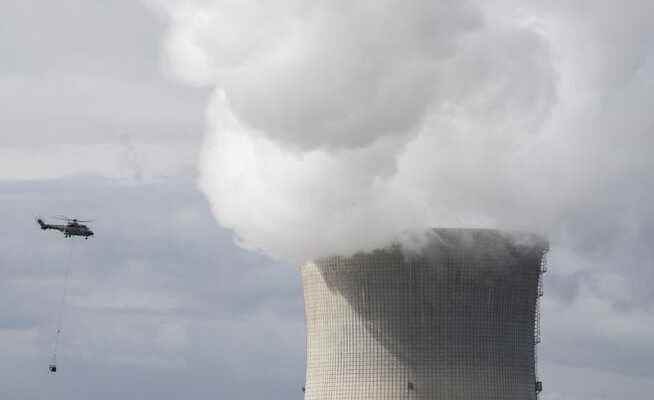If the three German nuclear power plants remain connected to the grid until April, the risk of an extreme power shortage in Switzerland this winter will decrease. But that doesn’t put you off the hook: a similarly tense situation is on the horizon for next year.
The German phase-out of nuclear power is being postponed – that will help Switzerland, but only in the short term.
Germany is postponing the phase-out of nuclear energy – if only by a few months. The last three nuclear power plants in Baden-Württemberg, Bavaria and Lower Saxony will continue to produce electricity until mid-April 2023. That’s what Chancellor Olaf Scholz decided on Monday evening. His decision still has to be approved by Parliament. The three nuclear power plants together have an output of a good 4 gigawatts. For comparison: The Swiss nuclear power plants in Leibstadt, Gösgen and Beznau, which produce around 30 percent of the local electricity, have an output of 3 gigawatts.
Security of supply improves
The decision by the northern neighbor is initially good news for Switzerland, at least for the coming winter: when asked, the Federal Electricity Commission (Elcom) explained that this would increase the security of supply in the region and at the same time reduce the risk of an extreme power shortage.
The two nuclear power plants in southern Germany, where consumption is particularly high, are particularly important for Switzerland. In Germany there are always grid bottlenecks because the power lines that are supposed to bring wind energy from the north to the consumers in the south are not sufficiently developed. In these cases, the transmission system operators have to intervene to keep the grid stable. This is less necessary if the nuclear power plants continue to run in the south.
The German government’s decision has also left its first mark on the futures market for electricity, which is regarded as a “fear barometer”. The focus here is on the electricity price for the first quarter of 2023, because that is when there is the greatest risk of an electricity shortage. In Germany, electricity cost for this period on Tuesday 418 euros per megawatt hour, around 8 percent less than the day before. That’s still four times as much as a year ago, but the price is now well below the more than 1,000 euros that had to be paid at the end of August. At that time, panic had spread in the electricity market.
However, letting the three German nuclear power plants continue to run for a short time only helps for this winter. Concerns are therefore increasingly focused on the winter of 2023/24. For the corresponding winter half-year, exchange prices are now paid for electricity that are slightly higher in Germany than the 418 euros for the first quarter of 2023.
The situation in Switzerland and France is currently somewhat different than in Germany. Here the stock market prices for the coming winter are still significantly higher than for the winter after that. This has to do with the availability of French nuclear power plants, which is also important for Switzerland because the country is dependent on electricity imports in winter.
About half of the 56 French reactors are currently not in operation. On the one hand, this is due to the fact that the corona pandemic has caused a backlog of revisions, which are now being made up for. On the other hand, corrosion damage was discovered, which led to checks on other reactors.
France is under great pressure to bring its nuclear reactors back online because a third of French people heat with electricity. French President Emmanuel Macron has therefore promised that all but eleven reactors will be back online by January 2023. However, there is currently a strike in ten French nuclear power plants. If industrial action continues, it could delay the commissioning schedule.
Availability of gas crucial
Whether or not there is a power shortage in winter also depends heavily on whether there is enough gas. Elcom emphasizes that this is crucial for Germany’s ability to produce and export, even if nuclear power plants are in operation for an extended period of time. Thanks to the warm autumn weather, things are looking good here at the moment, as German gas storage facilities are already 96 percent full. The gas price for November is currently 112 euros per megawatt hour. This corresponds to a third of the record value in August.
Here, too, the prices for the winter after next are now similarly high as for this winter. So while the probability of an extreme shortage for the next few months has decreased, there can be no question of the all-clear for 2023/24. Even if you get through the coming winter without major injuries, it could only be a short-term sigh of relief.
